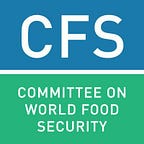Food and nutrition in protracted crises
A set of eleven principles to improve food security and nutrition
As the World Humanitarian Summit in Ankara, Turkey gets underway, countries that are suffering from long term or protracted crisis situations need to be given special consideration. In 2013 there were around 167 million undernourished people living in protracted crisis situations. The proportion of undernourished in protracted crises is about three times as high as in other developing contexts — and the longer the crisis, the worse food insecurity and undernutrition become. Strengthening resilience, and improving food security and nutrition, is key to improving the effectiveness of humanitarian responses and finding solutions to displacement caused by conflict and disasters. In response, the Committee on World Food Security (CFS) worked on developing specific policy guidance. In October 2015 the Framework for Action for Food Security and Nutrition in Protracted Crises was endorsed, representing the first global consensus on how to mitigate the threat to food security and nutrition during protracted crises.
It recognizes that building resilience can boost capacity to absorb shocks and long-term stresses. Given the severity of undernutrition in protracted crises, nutritional needs require a special focus especially for the most vulnerable and marginalized groups. In his report for the World Humanitarian Summit “One humanity: shared responsibility”, the UN Secretary General Ban Ki-moon calls for all stakeholders to work together to improve the lives of those living in protracted crisis. The Framework can be an important tool to accelerate progress for those at risk of being left behind. It consists of a set of eleven principles, summarized below:
Address Critical Manifestations and Build Resilience
It is crucial in protracted crises to promote coherent and well-coordinated humanitarian and development programming to address food insecurity and undernutrition, to save lives and to build resilience. Humanitarian assistance helps meet acute needs, in order to save lives, alleviate suffering, and maintain and protect human dignity. Resilience boosts the capacity to absorb, prepare for, and prevent humanitarian disasters, crises, and long-term stresses. It also contributes to the adaptation and transformation of livelihoods and food systems, progressing along a pathway out of the protracted crisis situation. This approach emphasizes women’s empowerment, as well as smallholder agriculture productivity and the wider economy, which are often neglected in responses to protracted crises. Given the severity of undernutrition in these situations, the nutritional needs of members of affected and at risk populations, vulnerable and marginalized groups, as well as people living in vulnerable situations, also benefit from a special focus.
Principle 1: Meet immediate humanitarian needs and build resilient livelihoods
Principle 2: Focus on nutritional needs
Adapt to specific challenges
Due to fragmentation, complexity, and insecurity, some challenges are magnified in protracted crises, which hinder efforts to improve food security and nutrition. Policies and actions may require a renewed focus, or need to be adapted to the specific circumstances of protracted crises.
Principle 3: Reach affected populations
Principle 4: Protect those affected by or at risk from protracted crises
Principle 5: Empower women and girls, promote gender equality and encourage gender sensitivity
Principle 6: Ensure and support comprehensive evidence-based analyses
Principle 7: Strengthen country ownership, participation, coordination and stakeholder buy-in, and accountability
Principle 8: Promote effective financing
Contribute to resolving underlying causes of food insecurity and undernutrition in protracted crises
Protracted crises require sustained approaches and some combination of lasting political, economic, social, and environmental solutions. Policies and actions should, where possible, contribute to resolving, and preventing, underlying causes of food insecurity and undernutrition in protracted crises.
Principle 9: Contribute to peacebuilding through food security and nutrition
Principle 10: Manage natural resources sustainably and reduce disaster risks
Principle 11: Promote effective national and local governance
Full details of the Principles are in the Framework which is intended for use by anyone who may have a role in improving or impacting food security and nutrition in protracted crises. Governments in particular have the primary responsibility but other intended users include:
- Public institutions and local authorities
- Political, peacekeeping, and peace-building actors
- Traditional authorities
- Inter-governmental and regional organizations
- Financial institutions, donors, foundations and funds
- Civil society organizations
- Research organizations, universities and extension organizations
- Private sector entities
- Farmers, family farmers, in particular smallholders and their organizations
- Communities and members of affected populations
- Consumer organizations
People living in protracted crisis situations already suffer enough through disruption to their lives and livelihoods. By applying this set of principles their food security and nutrition can be improved, both in the short- and the longer-term.
The Committee on World Food Security (CFS) is the leading international, intergovernmental and multi-stakeholder platform for food security and nutrition policy guidance. This article is based on the CFS Framework for Action for Food Security and Nutrition in Protracted Crises endorsed in 2015 and an extract from the UN High Level Political Forum as part of an assessment of the situation regarding the principle of “Ensuring that no one is left behind”, 2030 Agenda for Sustainable Development.
